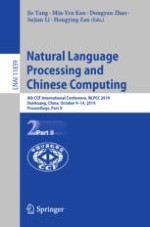2019 | OriginalPaper | Chapter
Subject Recognition in Chinese Sentences for Chatbots
Authors : Fangyuan Li, Huanhuan Wei, Qiangda Hao, Ruihong Zeng, Hao Shao, Wenliang Chen
Published in: Natural Language Processing and Chinese Computing
Publisher: Springer International Publishing
Activate our intelligent search to find suitable subject content or patents.
Select sections of text to find matching patents with Artificial Intelligence. powered by
Select sections of text to find additional relevant content using AI-assisted search. powered by
Abstract
 /zhu ti” in Chinese, while we use “grammatical subject” to denote traditional “
/zhu ti” in Chinese, while we use “grammatical subject” to denote traditional “
 /zhu yu” in Chinese.) recognition plays a significant role in the conversation with a Chatbot. The misclassification of the subject of a sentence leads to the misjudgment of the intention recognition. In this paper, we build a new dataset for subject recognition and propose several systems based on pre-trained language models. We first design annotation guidelines for human-chatbot conversational data, and hire annotators to build a new dataset according to the guidelines. Then, classification methods based on deep neural network are proposed. Finally, extensive experiments are conducted to testify the performance of different algorithms. The results show that our method achieves 88.5% \(F_1\) in the task of subject recognition. We also compare our systems with three other Chatbot systems and find ours perform the best.
/zhu yu” in Chinese.) recognition plays a significant role in the conversation with a Chatbot. The misclassification of the subject of a sentence leads to the misjudgment of the intention recognition. In this paper, we build a new dataset for subject recognition and propose several systems based on pre-trained language models. We first design annotation guidelines for human-chatbot conversational data, and hire annotators to build a new dataset according to the guidelines. Then, classification methods based on deep neural network are proposed. Finally, extensive experiments are conducted to testify the performance of different algorithms. The results show that our method achieves 88.5% \(F_1\) in the task of subject recognition. We also compare our systems with three other Chatbot systems and find ours perform the best.
